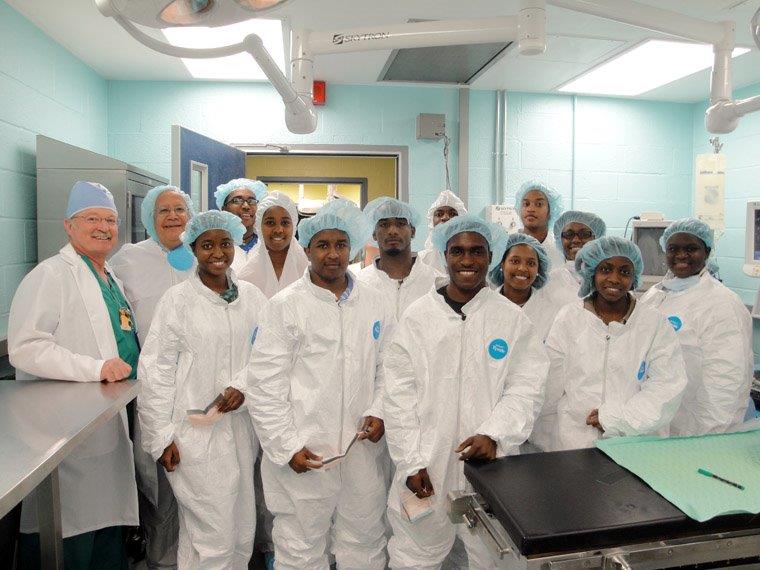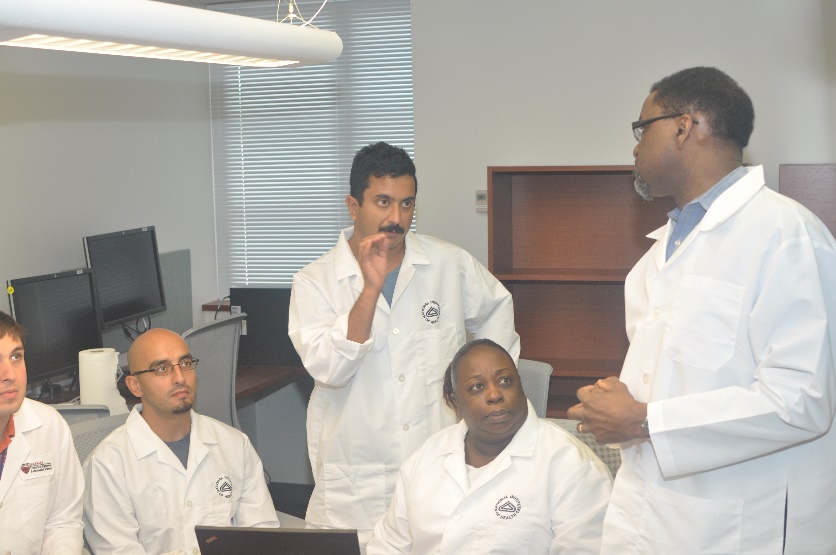
 The National Heart, Lung, and Blood Institute (NHLBI) provides global leadership for a research, training, and education program to promote the prevention and treatment of heart, lung, and blood diseases and enhance the health of all individuals so that they can live longer and more fulfilling lives.
The National Heart, Lung, and Blood Institute (NHLBI) provides global leadership for a research, training, and education program to promote the prevention and treatment of heart, lung, and blood diseases and enhance the health of all individuals so that they can live longer and more fulfilling lives.
The NHLBI stimulates basic discoveries about the causes of disease, enables the translation of basic discoveries into clinical practice, fosters training and mentoring of emerging scientists and physicians, and communicates research advances to the public. It creates and supports a robust, collaborative research infrastructure in partnership with private and public organizations, including academic institutions, industry, and other government agencies. The Institute collaborates with patients, families, health care professionals, scientists, professional societies, patient advocacy groups, community organizations, and the media to promote the application of research results and leverage resources to address public health needs. The NHLBI also collaborates with international organizations to help reduce the burden of heart, lung, and blood diseases worldwide.
Strategic Goal under NHLBI Mission
Diversity is fundamental to achieving the NHLBI mission. A key strategic goal under the NHLBI mission is to enable and develop a diverse biomedical workforce equipped with the essential research resources to pursue emerging opportunities in science. This goal focuses on enabling the biomedical workforce to fully capitalize on emerging scientific opportunities (1) by equipping today’s workforce with new skills and the necessary tools and resources, and (2) by cultivating a diverse next generation trained in cutting-edge science and the requisite multi-disciplinary skills.
 The NIH recognizes a unique and compelling need to promote diversity in the NIHfunded biomedical, behavioral, clinical, and social sciences workforce. The NHLBI, part of the NIH, expects efforts to diversify the workforce to lead to the recruitment of the most talented researchers from all groups, improve the quality of the educational and training environment, balance and broaden the perspective in setting research priorities, improve the ability to recruit subjects from diverse backgrounds into clinical research protocols, and improve the Nation’s capacity to address and eliminate health disparities. The NHLBI provides global leadership for research, training, and education programs to promote the prevention and treatment of cardiovascular, pulmonary, or hematologic diseases and sleep disorders and enhance the health of all individuals so that they can live longer and more fulfilling lives. The NHLBI recognizes a critical need to address national and global health disparities that disproportionately burden racial and ethnic minorities, individuals with disabilities, and disadvantaged populations. The Institute also has a long history of supporting biomedical, behavioral, and clinical and social sciences research and training to address cardiovascular, lung, and blood diseases and sleep disorders in these communities. Significant progress has been made in health outcomes. Recent years have also brought improvements in health disparities, although racial and ethnic minorities still lag in many areas including overall life expectancy. The health disparity populations are more likely to suffer from a host of illnesses such as diabetes, heart disease, stroke, asthma, and kidney disease. Thus, the NHLBI remains committed to addressing health disparity gaps in areas critical to the NHLBI scientific mission.
The NIH recognizes a unique and compelling need to promote diversity in the NIHfunded biomedical, behavioral, clinical, and social sciences workforce. The NHLBI, part of the NIH, expects efforts to diversify the workforce to lead to the recruitment of the most talented researchers from all groups, improve the quality of the educational and training environment, balance and broaden the perspective in setting research priorities, improve the ability to recruit subjects from diverse backgrounds into clinical research protocols, and improve the Nation’s capacity to address and eliminate health disparities. The NHLBI provides global leadership for research, training, and education programs to promote the prevention and treatment of cardiovascular, pulmonary, or hematologic diseases and sleep disorders and enhance the health of all individuals so that they can live longer and more fulfilling lives. The NHLBI recognizes a critical need to address national and global health disparities that disproportionately burden racial and ethnic minorities, individuals with disabilities, and disadvantaged populations. The Institute also has a long history of supporting biomedical, behavioral, and clinical and social sciences research and training to address cardiovascular, lung, and blood diseases and sleep disorders in these communities. Significant progress has been made in health outcomes. Recent years have also brought improvements in health disparities, although racial and ethnic minorities still lag in many areas including overall life expectancy. The health disparity populations are more likely to suffer from a host of illnesses such as diabetes, heart disease, stroke, asthma, and kidney disease. Thus, the NHLBI remains committed to addressing health disparity gaps in areas critical to the NHLBI scientific mission.
- Short-Term Research Education Program to Increase Diversity in Health-Related Research (R25 Clinical Trial Not Allowed)
- NRSA Individual Predoctoral Fellowship to Promote Diversity in Heath Related Research (Parent F31)
- T32 Training Program for Institutions That Promote Diversity (T32 Clinical Trial Not Allowed)
- Mentored Career Development Award to Promote Faculty Diversity in Biomedical Research (K01 Independent Clinical Trial Not Allowed)
- Mentored Career Development Award to Promote Faculty Diversity in Biomedical Research (K01 Independent Clinical Trial Required)
- RADM Helena O. Mishoe Fellowship for Underrepresented Scientists
- Programs for Inclusion and Diversity Among Individuals Engaged in Health-Related Research (PRIDE)






